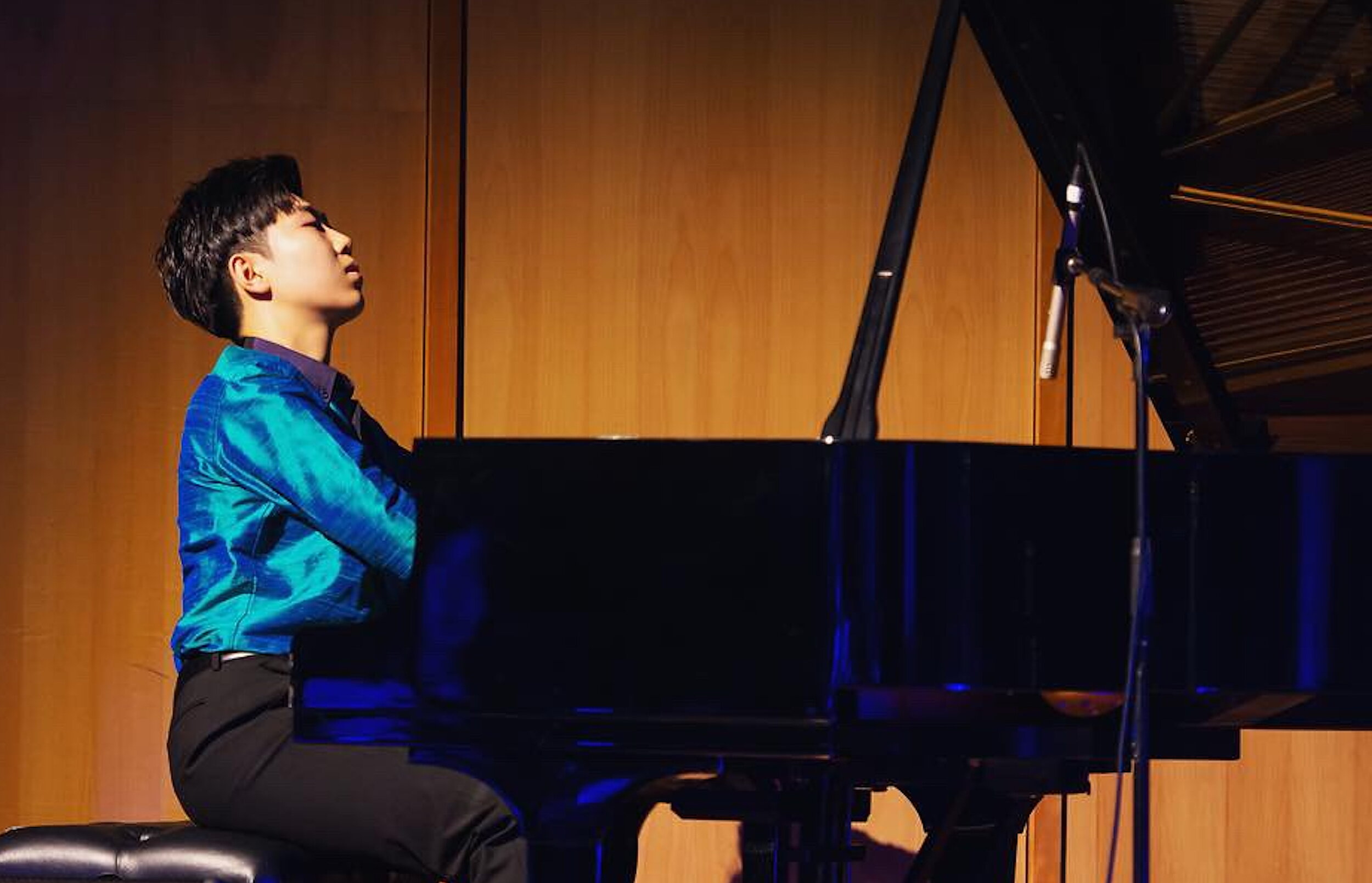A tale of two pianists
What attracts you to a concert? Why do you buy that ticket? For the performers? The works being played - or maybe the programme as a whole ?
Two very different piano recitals by exciting young New Zealand pianists recently offered thought-provoking contrasts.
Pianist Lixin Zhang
…a prodigious talent.
For a recent Sunday afternoon piano recital by 19-year old Lixin Zhang in Waikanae, it was the performer himself who piqued my interest. Three years ago images of a leaping, exuberant Zhang illustrated the sleeve of PLAY, his debut album from Rattle. That release, recorded before his 17th birthday, confirmed that the young musician, then completing his final year at Burnside High School in Christchurch, was a prodigious new talent.
Zhang’s repertoire choices on both his CD and in his Waikanae recital were pianists' music by composers who loved the keyboard and knew how to exploit its many timbres. This programme included three works by Chopin, first his Ballade No 1 in G minor, Opus 23. It’s enormously challenging technically but here became a vehicle for Zhang's unobtrusive virtuosity with sparkling passage work and always flexible musicianship. Chopin's 3rd Sonata in B minor Opus 58 showed a fine sense of musical structure and a variety of piano colours, while Zhang’s lovely flowing playing of the Nocturne in C minor revealed all the beauties of the Waikanae Music Society's splendid Fazioli piano.
Zhang is currently studying with Professor Fabio Bidini at the Colburn Conservatory of Music in Los Angeles on a full scholarship, although his studies are currently remote, with COVID keeping him in New Zealand. He has won many prizes in his career to date, most recently second prize and the Silver Medal in the 2021 Gina Bachauer International Young Artists Piano Competition.
Lixin Zhang
…unobtrusive virtuosity.
Mozart's Sonata in C major K330 opened the second half of Zhang’s programme. Its clarity was an appealing contrast to Chopin, light, lyrical and full of sprightly crispness that showed off another side of Zhang's pianism. His playful approach at the keyboard was a perfect match for Mozart’s wit in the final Allegretto.
The concert ended with Liszt, his Vallé d'Obermann, No 6 from Book 1 of the Années de pèlerinage (Years of Pilgrimage). Virtuosity was again required and while Zhang impressed with his rippling ornamentation, I was left with an even stronger impression of lovely singing tunefulness and this young pianist's great skill in balancing and bringing out the melodic lines within the texture.
The delighted audience demanded an encore and were well-pleased by Mikhail Glinka's The Lark arranged by Balakirev, one of the tracks on the Rattle CD and clearly, with its Lisztian arpeggios, a favourite party piece for Zhang.
Pianist Liam Wooding
…flowing pianism and thoughtful curation.
Photo credit: Ruby Shirres
A week earlier, Reflections and Connections, a Chamber Music New Zealand touring programme by New Zealand pianist Liam Wooding, hooked me in with its intriguing selection of composers and works and a thoughtful curatorial approach. Wooding’s recital for the Wellington Chamber Music Society began with Douglas Lilburn's Sonata for Piano in F# minor, written in 1939. Philip Norman’s Lilburn biography tells the story of the 24-year-old composer playing this rather romantic piece to an audience in London, losing his way in the 2nd movement and fleeing the stage. Easily recognisable as Lilburn's music through its modal harmonies and repeated note motives, it was, according to Wooding’s programme note, completed or revised in Whanganui after the composer returned from London in 1940. Here was the first “connection” of the programme – Wooding himself is from Whanganui.
Stuart Greenbaum’s Remote Connection was next, a 2021 “lockdown” piece written for Wooding by the Melbourne composer. A distinctive jazzy syncopated figure repeats throughout and the pianist’s technical command in the rapid final section was impressive. In spite of the gap of over sixty years between this work and the Lilburn that preceded it, there were some similarities between the works. Or was it Wooding’s approach that was similar? He played both works with flowing assured musicality, using a lot of pedal and giving a sense of a full texture with a lot going on.
Wooding, currently researching New Zealand piano music as a doctoral student at the University of Waikato, is a very accomplished pianist with a natural technique. I found myself, however, wanting more punctuation, clarity and tonal variety in Beethoven's “Moonlight” Sonata in C# minor. Was the pianist finding musical connections or creating them by a similar pianistic approach? In his programme note Wooding quoted Beethoven’s words about playing the work “with the greatest delicacy” but his approach to the pedal did not achieve this.
Liam Wooding …dazzling playing in John Adams’ Phrygian Gates
Photo credit: Pia Johnson
The second half of the programme worked better for me. Duke Ellington’s Reflections in D was strongly influenced by Debussy’s Reflets dans l’eau and an interesting pairing that revealed links between jazz and the French composers of the early 20th century. Wooding’s intelligent and personal programme notes added much to the recital and his flowing pianism suited all three of Debussy’s Images, especially the third, Mouvement.
His programme ended with a piece new to many in the audience. John Adams’ Phrygian Gates was composed by the American in 1977. In this high speed virtuosic tour de force for piano, Adams takes minimalism’s gradual harmonic shifts and repetition beyond the glittering surface into eloquence. Wooding carried the audience through the long work with dazzling playing, revealing music that occasionally reminded us of the storm-tossed final movement of the “Moonlight” Sonata or hinted at Debussy’s subtle textures as it built towards the dramatic surprise of the ending. It was a great choice and indeed the whole recital was a well-crafted opportunity to introduce the audience to a thought-provoking range of piano music. Reflections and Connections will be released soon as an album on New Zealand’s Rattle label.
The two recitals were satisfying in different ways. Wooding’s was a well-constructed, interesting and often surprising collection of mostly recent works, played with a personal style and a musical understanding of the links between them. Zhang’s was an unashamed celebration of Romantic piano music from standard repertoire with the contrast of Mozart’s lucidity and the pleasure throughout of beautiful playing. These are two young musicians to watch.
Reflections and Connections Liam Wooding (piano) Wellington Chamber Music Society, 25 July 2021
Piano recital, Lixin Zhang (piano) Waikanae Music Society, 1 August 2021




